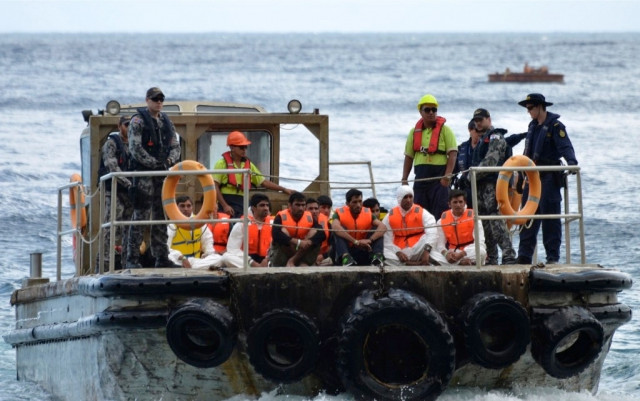Australia says 'broken the back' of people-smugglers
People-smuggling is a sensitive political issue in Australia.

People-smuggling is a sensitive political issue in Australia despite asylum-seekers arriving by boat in relatively small numbers by global standards. PHOTO: REUTERS
Burke said the ruling Labor party's plan to send all asylum-seekers arriving by boat to Papua New Guinea and Nauru in the Pacific for permanent resettlement - taking life in Australia off the table as an incentive - was working.
In the first month of operations the number of boat arrivals had more than halved from 4,236 in July to 1,585 in August, with just two vessels carrying a total of 58 passengers arriving in the past seven days, he said.
"While there will be a few more boats that will test our resolve and that will come, and a few more people that will take the risk, we have broken the back of the people-smuggling trade," he told reporters.
"The people-smuggling trade no longer has a product to sell."
When he first took the portfolio in June, Burke said boats were arriving almost daily and they were packed with between 100 and 200 passengers, making the latest arrivals, carrying 28 and 30 on board, a significant reduction.
"The people-smugglers have remained as desperate as ever to get boats off, and they have had increasing challenges in finding people that were willing to get on board, including people who had in fact already paid," he said.
By contrast, he said the Liberal-National opposition's plan to reintroduce temporary protection visas, force asylum-seekers arriving by boat onto welfare-for-work programmes and deny them family reunion or appeal rights risked the flow of boats simply resuming.
"If you open temporary visas to people who come by boat, there is still a product to sell," said Burke, accusing his opponents of "creating a circumstance where if there is a change of government then on Sunday there could be a product on the table again".
Burke also highlighted an independent assessment of conservative opposition leader Tony Abbott's controversial plan to buy up rickety Indonesian fishing boats to keep them from getting into the hands of people-smugglers.
Electoral fact-checking group PolitiFact Australia bestowed the scheme with their first "Pants on Fire" award of the election for a major party, declaring that of all Abbott's plans "this appears the most ridiculous".
The opposition leader, who is on track to win the September 7 election according to opinion polls, appeared to step back from the policy on Sunday, conceding that he may never actually buy a boat -- an admission PolitiFact described as "remarkable".
"There has been no policy more absurd than the concept that Australia would fund the Indonesian boat-building industry, nothing more ridiculous," said Burke.
The head of the Indonesian parliament's foreign affairs commission, Mahfudz Siddiq, has described the idea as "crazy" and "degrading and offensive to the dignity of Indonesians".
"Indonesia is not Australia's colony whose people can be bought for another country's interest," he said following the plan's release last month.
Abbott had vowed to visit Indonesia in his first week in office as part of his "Stop the Boats" plan, but qualified that Monday by saying he would go "as soon as is reasonably possible" at a time "convenient to our Indonesian hosts".
People-smuggling is a sensitive political issue in Australia despite asylum-seekers arriving by boat in relatively small numbers by global standards.
Hundreds have died attempting the dangerous voyage to Australia from transit hubs in Indonesia and Sri Lanka in recent years, with their flimsy, overloaded boats capsizing or sinking in remote waters.



















COMMENTS
Comments are moderated and generally will be posted if they are on-topic and not abusive.
For more information, please see our Comments FAQ